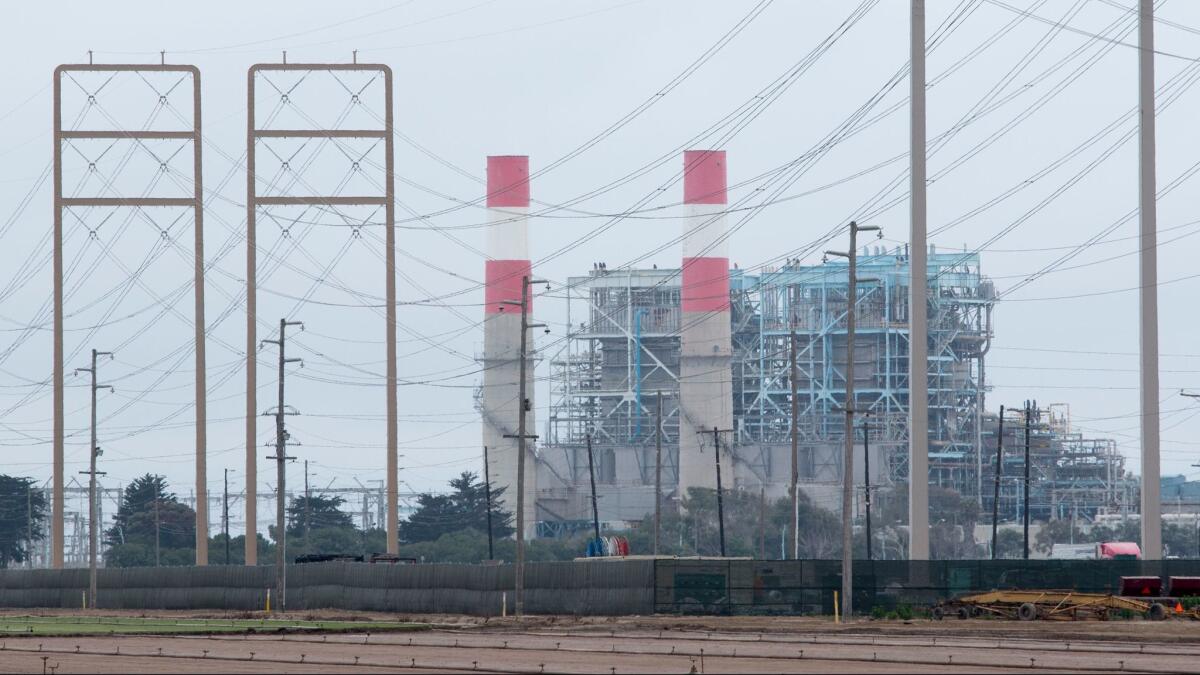State regulators accept a proposal for studying clean alternatives to an Oxnard natural gas plant

- Share via
State regulators have accepted a proposal for a study of clean-energy alternatives to a proposed natural gas power plant in Ventura County — the second decision within a week to reassess building new fossil fuel facilities.
The California Independent System Operator, which manages the electrical grid for much of the state, had offered to conduct the study after prodding by the organization’s governing board.
Members of the California Energy Commission reviewing the planned Puente natural gas plant deliberated for much of last week before issuing a seven-page statement late Friday in support of the study. If a review can help determine whether energy storage or other sources can help meet Oxnard’s electricity needs, they should be considered as a substitute for building the planned Puente natural gas plant, the committee statement said.
“The committee understands development of such a study is normally a complex and intensive undertaking, but is hopeful that the California ISO will be able to derive a simplified set of assumptions that will allow the ISO to provide meaningful results,” wrote energy commissioners Janea Scott and Karen Douglas, who conducted the committee hearings.
The commissioners gave the grid operator until June 16 to say whether it will conduct the study and requested that it be completed no later than July 19.
Representatives of the system operator told the committee last week that the study could be completed in three to four weeks.
The commissioners’ decision drew an immediate response from NRG Energy Inc., which would build and own the Puente power plant with Southern California Edison Co. as the electricity customer. Edison’s ratepayers would foot the bill.
“Six months ago, in December 2016, the [California Public Utilities Commission] approved … the Puente Power Project as necessary and appropriate to maintain reliable electric service in the Oxnard area,” NRG spokesman David B. Knox said in a statement.
“Since that time, no additional feasible, cost-effective and available preferred resources have been identified that would eliminate the need for the Puente Power Project,” Knox said. “We appreciate the commission striving to keep the project on schedule and remain confident that additional studies will continue to confirm the need for the Puente Power Project.”
Edison said it contracted for the Puente project under a directive from the California Public Utilities Commission to ensure that there are sufficient electric resources available to serve the Moorpark area of Ventura County after aging, gas-fired plants close by 2021.
“SCE was only responsible to ensure that sufficient resources were contracted,” said Janet Clayton, Edison’s senior vice president for corporate communications. “SCE does not own or profit from the operation of any of these resources.”
Environmentalists hailed the energy commission’s decision as long overdue. They said similar reviews should have been conducted before final approval of several other natural gas projects they believe aren’t needed.
“We have the technology to meet reliability needs without new gas plants. The only thing we need is political will,” said Matt Vespa, senior attorney at the Sierra Club.
Billionaire Tom Steyer, president of NextGen Climate, said the study is a step in the right direction but that regulators shouldn’t stop there.
“The CEC must uphold its duty to California citizens by rejecting this plan outright,” Steyer said. “There are better clean energy alternatives that would cost less and protect the Ventura community’s environment and public health.”
The review of the Puente project follows a decision Tuesday by the Los Angeles Department of Water and Power to conduct a study to determine if clean-energy alternatives could replace natural gas plants that the agency is set to rebuild.
The DWP study is expected to be completed in the first quarter of 2018.
The Puente project and the DWP plants are among eight different projects in Southern California to build or retool natural gas plants.
Regulators and the utility industry have argued that the plants are needed close to customers to ensure reliability of the electrical grid, in particular when night falls or clouds reduce solar power and when the wind isn’t blowing to generate electricity from windmills.
But since the plants were initially proposed and given preliminary approval, the cost of solar panels, wind power and energy storage have dropped so that the cost is on par with or less than fossil fuel plants. And energy storage has increasingly become viable and cost-effective.
The fresh scrutiny of the natural gas plant proposals comes after a Los Angeles Times investigation found that the state is operating with an oversupply of electricity, driven largely by the construction of gas-fueled generating plants, leading to higher rates. The state’s power plants are on track to be able to produce at least 21% more electricity than needed by 2020, according to the Times report.
Californians are footing a $40-billion annual bill while using less electricity, paying $6.8 billion more than they did in 2008 when power use in the state was at its all-time high. Electricity consumption has since fallen and remained largely flat.
For more energy news, follow Ivan Penn on Twitter: @ivanlpenn
UPDATES:
4:25 p.m.: This article was updated to include reaction to the energy commission committee decision as well as additional analysis.
This article was originally published at 8:10 p.m. June 9.
More to Read
Inside the business of entertainment
The Wide Shot brings you news, analysis and insights on everything from streaming wars to production — and what it all means for the future.
You may occasionally receive promotional content from the Los Angeles Times.











